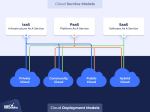“When weighing the Cloud Computing advantages and disadvantages, it’s important to keep the sources of those pros and cons in mind.”
AKG
Cloud Computing can offer your business a number of advantages. It allows you to set up a virtual office with access to your tools and services anywhere and anytime, through a web-enabled device.
Despite its many advantages, Cloud Computing is not without its issues. You should be aware of these if you’re considering moving your business into the cloud.
Advantages Of Cloud Computing
The primary, all-encompassing reason to adopt Cloud Computing is that the business doesn’t need to concern itself with building, staffing, and maintaining an in-house data center. The company pays the provider to worry about all that.
However, there are many more advantages to using the Cloud, such as:
- Cost-efficiency. Customers don’t have to buy equipment or pay the salaries of an entire IT department to maintain and upgrade infrastructure and related software. And let’s not forget the elimination of other related expenses like utility costs (e.g., electricity).
- Speed. Cloud providers supply their customers with rapid, on-demand self-service, so just a few clicks of a mouse brings any needed resource expansions up and running online.
- Elastic scaling. Maybe a company needs more cloud resources during certain times of the year (e.g., holiday sales, month-end accounting) and fewer resources at other times. Elastic scaling gives the customer access to the right amount of resources (e.g., storage, processing power, bandwidth) only when they’re needed through automation.
- Accessibility. Access your data anywhere, anytime. An Internet cloud infrastructure maximizes enterprise productivity and efficiency by ensuring your application is always accessible. This allows for easy collaboration and sharing among users in multiple locations.
- Access to new technologies.
Cloud Computing can help ensure that you always have access to the latest technology. You would no longer need to worry about updating your software or investing in new back-end technology – as your service provider could manage this on your behalf. This can also give you access to software, hardware and IT functionality that would be too expensive to buy outright. - Increased productivity. As a rule, cloud computing doesn’t result in the complete removal of the customer’s IT department, but it does reduce the necessity of having a vast department. With the cloud provider handling time-consuming, mundane chores like software patches and hardware setup, the customers can have a streamlined, efficient IT department free to handle the more strategic business needs.
- Security. Although the idea of having confidential data stored offsite on a shared server sounds scary, cloud providers know that if they want to stay in business, they better provide excellent security. Fortunately, they do.
- Business continuity. Cloud computing can back up and mirror useful data on many redundant network sites, making it easier for businesses to recover from disasters.
- Efficient recovery. Cloud Computing delivers faster and more accurate retrievals of applications and data. With less downtime, it is the most efficient recovery plan.
- Easy implementation. Cloud hosting allows business to retain the same applications and business processes without having to deal with the backend technicalities. Readily manageable by the Internet, a cloud infrastructure can be accessed by enterprises easily and quickly.
Disadvantages Of Cloud Computing
If Cloud Computing were perfect, everyone would be doing it. And although Cloud Computing is a prevalent and continuously growing platform, it brings along its share of drawbacks that prevent it from being universally embraced.
- What was that about the cost? Just like renting a living space isn’t necessarily cheaper than buying a house outright, cloud computing platforms aren’t always a great bargain. The cost comes down to the business’ unique needs and situations. It could be that it’s cheaper to have a small, in-house data center that runs the same applications as clockwork every month.
- Migration can also be expensive. In some situations, migrating from an in-house system to the cloud may incur excessive expenses and pose a significant difficulty.
- There are still trust issues. Some businesses balk at the idea of their confidential information stored on the same servers as their competitors’ data, potentially crippling a competitive advantage.
- No longer in control. When moving services to the cloud, you are handing over your data and information. For companies who have an in-house IT staff, they will be unable to handle issues on their own.
- May not get all the features. Not all cloud services are the same. Some cloud providers tend to offer limited versions and enable the most popular features only, so you may not receive every feature or customization you want. Before signing up, make sure you know what your cloud service provider offers.
- Cloud downtime. The cloud, like any other IT set-up, can experience technical problems such as reboots, network outages and downtime. These events can incapacitate business operations and processes, and can be damaging to business.
- Cloud security and data. Most cloud service providers implement relevant security standards and industry certifications to ensure that their cloud environment remains safe. However, storing data and business-critical files in virtual data centres can potentially open you up to risks like data loss or theft, account or service hijacking, denial of service attacks, technology vulnerabilities, especially on shared environments etc.
- Cloud service closes shop. In a mature industry, you usually deal with one of a handful of known players that offer time-tested, reliable services. Cloud computing is a young industry with lots of companies vying for business. There is a possibility that your cloud provider will run out of money and close their doors forever.
Final Thoughts
Despite all the Cloud Computing advantages and disadvantages, we can’t deny the fact that Cloud Computing is the fastest growing part of network-based computing. It offers a great advantage to customers of all sizes: simple users, developers, enterprises and all types of organizations. So, this technology here to stay for a long time.
🅐🅚🅖
Interested in Management, Design or Technology Consulting, contact anil.kg.26@gmail.com
Get updates and news on our social channels!
LATEST POSTS
- A Tale Of Two Frameworks: Spring Boot vs. Django
 “Spring Boot’s convention over configuration approach simplifies development, allowing developers to focus on building robust applications rather than wrestling with… Read more: A Tale Of Two Frameworks: Spring Boot vs. Django
“Spring Boot’s convention over configuration approach simplifies development, allowing developers to focus on building robust applications rather than wrestling with… Read more: A Tale Of Two Frameworks: Spring Boot vs. Django - Unleashing The Power Of Django
 “Django, akin to a Swiss Army knife, provides a comprehensive toolkit, facilitating developers in tackling diverse web development challenges with… Read more: Unleashing The Power Of Django
“Django, akin to a Swiss Army knife, provides a comprehensive toolkit, facilitating developers in tackling diverse web development challenges with… Read more: Unleashing The Power Of Django - Potential of Progressive Web Apps (PWAs)
 “PWAs are not just about technology; they are about creating meaningful connections with users.” Why PWAs Are the Next Frontier… Read more: Potential of Progressive Web Apps (PWAs)
“PWAs are not just about technology; they are about creating meaningful connections with users.” Why PWAs Are the Next Frontier… Read more: Potential of Progressive Web Apps (PWAs) - Unleashing The Power Of Spring Framework
 “Spring Framework simplifies enterprise Java development, but it does so in a way that embraces existing frameworks and infrastructure.” –… Read more: Unleashing The Power Of Spring Framework
“Spring Framework simplifies enterprise Java development, but it does so in a way that embraces existing frameworks and infrastructure.” –… Read more: Unleashing The Power Of Spring Framework - Key Trends Of OSINT In 2024
 “The future of OSINT lies in our ability to adapt and innovate. By embracing emerging technologies and ethical best practices,… Read more: Key Trends Of OSINT In 2024
“The future of OSINT lies in our ability to adapt and innovate. By embracing emerging technologies and ethical best practices,… Read more: Key Trends Of OSINT In 2024 - Can Google’s Carbon Language Replace C++?
 “While Carbon may excel in performance-critical domains, it cannot replace the versatility and extensive ecosystem of C++.” As the world… Read more: Can Google’s Carbon Language Replace C++?
“While Carbon may excel in performance-critical domains, it cannot replace the versatility and extensive ecosystem of C++.” As the world… Read more: Can Google’s Carbon Language Replace C++? - Integration of Design Thinking, Lean, and Agile
 “Innovation thrives when Design Thinking, Lean, and Agile converge, creating a powerful force that propels organizations towards excellence.” In today’s… Read more: Integration of Design Thinking, Lean, and Agile
“Innovation thrives when Design Thinking, Lean, and Agile converge, creating a powerful force that propels organizations towards excellence.” In today’s… Read more: Integration of Design Thinking, Lean, and Agile - Benefits Of Infrastructure as Code (IaC)
 “Infrastructure as Code is the single most important thing you can do to improve the agility, reliability, and security of… Read more: Benefits Of Infrastructure as Code (IaC)
“Infrastructure as Code is the single most important thing you can do to improve the agility, reliability, and security of… Read more: Benefits Of Infrastructure as Code (IaC) - Power Of Internet of Everything (IoE)
 “The true power of the Intebrnet of Everything lies not in the things themselves, but in the connections and insights… Read more: Power Of Internet of Everything (IoE)
“The true power of the Intebrnet of Everything lies not in the things themselves, but in the connections and insights… Read more: Power Of Internet of Everything (IoE) - How Is The Enterprise IoT Evolving?
 “IoT is not just about connecting things; it’s about connecting minds, creating experiences, and transforming industries.” Pavan Singh, IoT Mentor… Read more: How Is The Enterprise IoT Evolving?
“IoT is not just about connecting things; it’s about connecting minds, creating experiences, and transforming industries.” Pavan Singh, IoT Mentor… Read more: How Is The Enterprise IoT Evolving? - IT Pricing Strategy And Models
 “The art of pricing lies in finding the perfect balance between capturing value and satisfying customers.” In the ever-evolving landscape… Read more: IT Pricing Strategy And Models
“The art of pricing lies in finding the perfect balance between capturing value and satisfying customers.” In the ever-evolving landscape… Read more: IT Pricing Strategy And Models - What Is SYCL (“sickle”)?
 “SYCL provides a powerful and intuitive programming model that simplifies heterogeneous computing, allowing developers to write portable code that can… Read more: What Is SYCL (“sickle”)?
“SYCL provides a powerful and intuitive programming model that simplifies heterogeneous computing, allowing developers to write portable code that can… Read more: What Is SYCL (“sickle”)? - What Is A Data Lakehouse?
 “With a data lakehouse, organizations can break down data silos, democratize data access, and accelerate innovation by enabling data exploration… Read more: What Is A Data Lakehouse?
“With a data lakehouse, organizations can break down data silos, democratize data access, and accelerate innovation by enabling data exploration… Read more: What Is A Data Lakehouse? - 5G – The Future Of The Internet
 “5G is the next big step in the evolution of wireless technology. It will offer significantly faster speeds and lower… Read more: 5G – The Future Of The Internet
“5G is the next big step in the evolution of wireless technology. It will offer significantly faster speeds and lower… Read more: 5G – The Future Of The Internet - Ransomware Groups Are Switching To Rust
 “Rust is to Ransomware what a lockpick is to a thief – a powerful tool that can be used for… Read more: Ransomware Groups Are Switching To Rust
“Rust is to Ransomware what a lockpick is to a thief – a powerful tool that can be used for… Read more: Ransomware Groups Are Switching To Rust - Streaming Data Pipelines
 “A streaming data pipeline is like a river: it flows continuously, changes constantly, and requires monitoring to ensure it stays… Read more: Streaming Data Pipelines
“A streaming data pipeline is like a river: it flows continuously, changes constantly, and requires monitoring to ensure it stays… Read more: Streaming Data Pipelines - Why Rust Is Best?
 “Rust is a systems programming language that runs blazingly fast, prevents segfaults, and guarantees thread safety.” Rust is a modern… Read more: Why Rust Is Best?
“Rust is a systems programming language that runs blazingly fast, prevents segfaults, and guarantees thread safety.” Rust is a modern… Read more: Why Rust Is Best? - Database Sharding Explained
 “Database sharding is like breaking a large puzzle into smaller, more manageable pieces, enabling improved scalability, performance, and availability, but… Read more: Database Sharding Explained
“Database sharding is like breaking a large puzzle into smaller, more manageable pieces, enabling improved scalability, performance, and availability, but… Read more: Database Sharding Explained - Ambient Computing Will Be The Future Tech
 “Ambient computing creates a seamless technology-rich environment, but challenges in privacy, security, ethics, interoperability, user acceptance, and technical complexity must… Read more: Ambient Computing Will Be The Future Tech
“Ambient computing creates a seamless technology-rich environment, but challenges in privacy, security, ethics, interoperability, user acceptance, and technical complexity must… Read more: Ambient Computing Will Be The Future Tech - Key Trends Of OSINT In 2023
 “OSINT is not just a technique, it’s a mindset. It’s about looking at the world with an open mind and… Read more: Key Trends Of OSINT In 2023
“OSINT is not just a technique, it’s a mindset. It’s about looking at the world with an open mind and… Read more: Key Trends Of OSINT In 2023 - Why Is OSINT Important?
 “OSINT is not just a technique, it’s a mindset. It’s about looking at the world with an open mind and… Read more: Why Is OSINT Important?
“OSINT is not just a technique, it’s a mindset. It’s about looking at the world with an open mind and… Read more: Why Is OSINT Important? - DataOps Explained
 “DataOps is the practice of integrating data engineering and data analytics to enable agile development, testing, and deployment of data-driven… Read more: DataOps Explained
“DataOps is the practice of integrating data engineering and data analytics to enable agile development, testing, and deployment of data-driven… Read more: DataOps Explained - Transformation Platform as a Service (tPaaS)
 “tPaaS is all about enabling Digital Transformation by providing a platform that supports fast, agile and secure development and deployment… Read more: Transformation Platform as a Service (tPaaS)
“tPaaS is all about enabling Digital Transformation by providing a platform that supports fast, agile and secure development and deployment… Read more: Transformation Platform as a Service (tPaaS) - Hello Julia – Programming Language For Scientific Computing
 “Julia is a high-level, high-performance dynamic programming language designed for numerical computing, data science, and scientific computing.” The Julia Language… Read more: Hello Julia – Programming Language For Scientific Computing
“Julia is a high-level, high-performance dynamic programming language designed for numerical computing, data science, and scientific computing.” The Julia Language… Read more: Hello Julia – Programming Language For Scientific Computing - Top Programming Languages For Fintech
 “The top programming languages for Fintech are those that provide robust and secure frameworks for handling sensitive financial data, as… Read more: Top Programming Languages For Fintech
“The top programming languages for Fintech are those that provide robust and secure frameworks for handling sensitive financial data, as… Read more: Top Programming Languages For Fintech - How To Choose A NoSQL Database
 “SQL databases are like Excel spreadsheets. They’re good for storing structured data that you need to query in a specific… Read more: How To Choose A NoSQL Database
“SQL databases are like Excel spreadsheets. They’re good for storing structured data that you need to query in a specific… Read more: How To Choose A NoSQL Database - Zero Knowledge Proof Explained
 “Zero Knowledge Proof is a powerful cryptographic tool that enables secure and private communication without revealing sensitive information, making it… Read more: Zero Knowledge Proof Explained
“Zero Knowledge Proof is a powerful cryptographic tool that enables secure and private communication without revealing sensitive information, making it… Read more: Zero Knowledge Proof Explained - Embracing Decentralized CyberSecurity
 “Decentralized CyberSecurity moves responsibilities and controls away from the center, to the individual areas most vulnerable to attack today.” Security… Read more: Embracing Decentralized CyberSecurity
“Decentralized CyberSecurity moves responsibilities and controls away from the center, to the individual areas most vulnerable to attack today.” Security… Read more: Embracing Decentralized CyberSecurity - Global Impact of Ransomware Attacks
 “The global impact of ransomware attacks is a sobering reminder that cybersecurity is not just about protecting our data and… Read more: Global Impact of Ransomware Attacks
“The global impact of ransomware attacks is a sobering reminder that cybersecurity is not just about protecting our data and… Read more: Global Impact of Ransomware Attacks - Process Orchestrator Explained
 “Process orchestrator is the ultimate tool for achieving operational excellence, enabling you to optimize processes, improve productivity, and reduce costs.”… Read more: Process Orchestrator Explained
“Process orchestrator is the ultimate tool for achieving operational excellence, enabling you to optimize processes, improve productivity, and reduce costs.”… Read more: Process Orchestrator Explained - What Does Platform Engineering Do?
 “The success of a Digital Platform depends on the strength of its underlying engineering. Solid engineering principles ensure reliability, scalability,… Read more: What Does Platform Engineering Do?
“The success of a Digital Platform depends on the strength of its underlying engineering. Solid engineering principles ensure reliability, scalability,… Read more: What Does Platform Engineering Do? - Are Full-Stack Developers Obsolete?
 “According to the Stack Overflow 2016 Developer Survey, Full-Stack Developers are one of the highest-paid and most sought-after professionals today.”… Read more: Are Full-Stack Developers Obsolete?
“According to the Stack Overflow 2016 Developer Survey, Full-Stack Developers are one of the highest-paid and most sought-after professionals today.”… Read more: Are Full-Stack Developers Obsolete? - Top 5 Issues For Overusing Microservices
 “Microservices should only be seriously considered after evaluating the alternative paths.” The overuse of new architectural styles is common within… Read more: Top 5 Issues For Overusing Microservices
“Microservices should only be seriously considered after evaluating the alternative paths.” The overuse of new architectural styles is common within… Read more: Top 5 Issues For Overusing Microservices - Customer Experience (CX) Trends In 2023
 “Customer Experience is the next competitive battleground. It’s where business is going to be won or lost.” Tom Knighton, Executive… Read more: Customer Experience (CX) Trends In 2023
“Customer Experience is the next competitive battleground. It’s where business is going to be won or lost.” Tom Knighton, Executive… Read more: Customer Experience (CX) Trends In 2023 - Cognitive Computing In 2023 And Beyond
 “IBM defines Cognitive Computing as systems that learn at scale, reason with purpose and interact with humans naturally.” 2022 was… Read more: Cognitive Computing In 2023 And Beyond
“IBM defines Cognitive Computing as systems that learn at scale, reason with purpose and interact with humans naturally.” 2022 was… Read more: Cognitive Computing In 2023 And Beyond - Top 7 Digital Transformation Trends In 2023
 “The threat of a recession coupled with the ongoing need for transformation and growth means CIOs must make force multiplying… Read more: Top 7 Digital Transformation Trends In 2023
“The threat of a recession coupled with the ongoing need for transformation and growth means CIOs must make force multiplying… Read more: Top 7 Digital Transformation Trends In 2023 - Top 5 DevOps Trends in 2023
 “The Global DevOps market size is expected to expand at a CAGR of 24.59% by 2027, reaching over 22199.4 million… Read more: Top 5 DevOps Trends in 2023
“The Global DevOps market size is expected to expand at a CAGR of 24.59% by 2027, reaching over 22199.4 million… Read more: Top 5 DevOps Trends in 2023 - Top 5 Cybersecurity Predictions For 2023
 “Cybersecurity will continue to be a major focus for company leaders as they bolster their digital defenses in 2023 and… Read more: Top 5 Cybersecurity Predictions For 2023
“Cybersecurity will continue to be a major focus for company leaders as they bolster their digital defenses in 2023 and… Read more: Top 5 Cybersecurity Predictions For 2023 - Top 5 Cloud Computing Trends In 2023
 “Cloud Computing has been one of the most critical technologies of the last decade.” The ongoing mass adoption of Cloud… Read more: Top 5 Cloud Computing Trends In 2023
“Cloud Computing has been one of the most critical technologies of the last decade.” The ongoing mass adoption of Cloud… Read more: Top 5 Cloud Computing Trends In 2023 - 10 Technology Trends For 2023
 What are the best new technologies to learn to improve your career and knowledge? Technology today is evolving at a… Read more: 10 Technology Trends For 2023
What are the best new technologies to learn to improve your career and knowledge? Technology today is evolving at a… Read more: 10 Technology Trends For 2023 - Top 5 AI /ML Trends In 2023
 “AI continues to transform our world as companies look to win over consumers with intelligent experiences delivered in real time… Read more: Top 5 AI /ML Trends In 2023
“AI continues to transform our world as companies look to win over consumers with intelligent experiences delivered in real time… Read more: Top 5 AI /ML Trends In 2023 - Android Runs Better When Covered In Rust
 “C/C++ should no longer be used to start new projects and that Rust should be deployed where a language without… Read more: Android Runs Better When Covered In Rust
“C/C++ should no longer be used to start new projects and that Rust should be deployed where a language without… Read more: Android Runs Better When Covered In Rust - Cybersecurity Mesh Architecture (CSMA)
 “CSMA is geared toward simplifying security architecture by encouraging collaboration and integration of a corporate security architecture.” One of the… Read more: Cybersecurity Mesh Architecture (CSMA)
“CSMA is geared toward simplifying security architecture by encouraging collaboration and integration of a corporate security architecture.” One of the… Read more: Cybersecurity Mesh Architecture (CSMA) - Data Mesh And It’s Principles
 “Data Mesh is a strategic approach to modern data management and a way to strengthen an organization’s digital transformation journey,… Read more: Data Mesh And It’s Principles
“Data Mesh is a strategic approach to modern data management and a way to strengthen an organization’s digital transformation journey,… Read more: Data Mesh And It’s Principles - Hard Tech To Disrupt The Future
 “Affordable robotics, AI-driven sensor fusion, uninterrupted connectivity and supermaterials are merging into the technology stack to unlock massive new tranches… Read more: Hard Tech To Disrupt The Future
“Affordable robotics, AI-driven sensor fusion, uninterrupted connectivity and supermaterials are merging into the technology stack to unlock massive new tranches… Read more: Hard Tech To Disrupt The Future - Top 5 Cloud Computing Vulnerabilities
 “Protecting your organization requires accepting the fact that your systems will be breached at some point; therefore, your strategy should… Read more: Top 5 Cloud Computing Vulnerabilities
“Protecting your organization requires accepting the fact that your systems will be breached at some point; therefore, your strategy should… Read more: Top 5 Cloud Computing Vulnerabilities - What’s Next After Cloud Computing – Edge?
 “Now, some companies are looking to replace Cloud Computing with something called Sky, Edge, or Hybrid Computing.” In the past few… Read more: What’s Next After Cloud Computing – Edge?
“Now, some companies are looking to replace Cloud Computing with something called Sky, Edge, or Hybrid Computing.” In the past few… Read more: What’s Next After Cloud Computing – Edge? - Chip To Cloud IoT
 “Chip-to-Cloud IoT looks like a promising way to .build a more secure, useful and decentralized technology for all.” Shannon Flynn… Read more: Chip To Cloud IoT
“Chip-to-Cloud IoT looks like a promising way to .build a more secure, useful and decentralized technology for all.” Shannon Flynn… Read more: Chip To Cloud IoT - How To Secure The Cloud
 “Encryption, Configuration are one of the best ways to secure your Cloud Computing systems.’ Fortunately, there is a lot that you… Read more: How To Secure The Cloud
“Encryption, Configuration are one of the best ways to secure your Cloud Computing systems.’ Fortunately, there is a lot that you… Read more: How To Secure The Cloud - Top 7 Advanced Cloud Security Challenges
 “Before jumping feet-first into the Cloud, understand the new and continuing top Cloud Security challenges your organization is likely to… Read more: Top 7 Advanced Cloud Security Challenges
“Before jumping feet-first into the Cloud, understand the new and continuing top Cloud Security challenges your organization is likely to… Read more: Top 7 Advanced Cloud Security Challenges - Why Cloud Security Is Important
 “Cloud Security is the whole bundle of technology, protocols, and best practices that protect Cloud Computing environments, applications running in… Read more: Why Cloud Security Is Important
“Cloud Security is the whole bundle of technology, protocols, and best practices that protect Cloud Computing environments, applications running in… Read more: Why Cloud Security Is Important - Why Implement Zero Trust Security Model?
 “Zero Trust extends the principle of ‘least privilege’ to its ultimate conclusion: Trust no one and grant the least privilege,… Read more: Why Implement Zero Trust Security Model?
“Zero Trust extends the principle of ‘least privilege’ to its ultimate conclusion: Trust no one and grant the least privilege,… Read more: Why Implement Zero Trust Security Model? - Advantages And Disadvantages Of Cloud Computing
 “When weighing the Cloud Computing advantages and disadvantages, it’s important to keep the sources of those pros and cons in… Read more: Advantages And Disadvantages Of Cloud Computing
“When weighing the Cloud Computing advantages and disadvantages, it’s important to keep the sources of those pros and cons in… Read more: Advantages And Disadvantages Of Cloud Computing - Benefits Of Cloud Computing
 “Cloud Computing benefits organizations in many ways. In fact, the benefits are so numerous that it makes it almost impossible not… Read more: Benefits Of Cloud Computing
“Cloud Computing benefits organizations in many ways. In fact, the benefits are so numerous that it makes it almost impossible not… Read more: Benefits Of Cloud Computing - Why WebAssembly Is The Future Of Computing?
 “WebAssembly is a binary instruction format and virtual machine that brings near-native performance to web browser applications, and allows developers… Read more: Why WebAssembly Is The Future Of Computing?
“WebAssembly is a binary instruction format and virtual machine that brings near-native performance to web browser applications, and allows developers… Read more: Why WebAssembly Is The Future Of Computing? - Virtualization In Cloud Computing
 “Virtualization and Cloud Computing are often discussed interchangeably, but while they’re closely associated, these tech terms have crucial differences.” Virtualization… Read more: Virtualization In Cloud Computing
“Virtualization and Cloud Computing are often discussed interchangeably, but while they’re closely associated, these tech terms have crucial differences.” Virtualization… Read more: Virtualization In Cloud Computing - Cloud Service And Deployment Models
 “I don’t need a hard disk in my computer if I can get to the server faster… carrying around these… Read more: Cloud Service And Deployment Models
“I don’t need a hard disk in my computer if I can get to the server faster… carrying around these… Read more: Cloud Service And Deployment Models - Why Use Serverless Computing
 “Serverless Computing is a Cloud computing execution model that lets software developers build and run applications and servers without having… Read more: Why Use Serverless Computing
“Serverless Computing is a Cloud computing execution model that lets software developers build and run applications and servers without having… Read more: Why Use Serverless Computing - Spatial Computing Revolutionizing Our World
 “Today, new technologies are advancing at dizzying speeds –impacting all areas of our lives, including how we shop and pay… Read more: Spatial Computing Revolutionizing Our World
“Today, new technologies are advancing at dizzying speeds –impacting all areas of our lives, including how we shop and pay… Read more: Spatial Computing Revolutionizing Our World - Trending Fullstack Frameworks
 “Writing the first 90 percent of a computer program takes 90 percent of the time. The remaining ten percent also… Read more: Trending Fullstack Frameworks
“Writing the first 90 percent of a computer program takes 90 percent of the time. The remaining ten percent also… Read more: Trending Fullstack Frameworks - Threat Intelligence Explained
 “Threat intelligence is evidence-based knowledge about an existing or emerging menace or hazard to assets that can be used to… Read more: Threat Intelligence Explained
“Threat intelligence is evidence-based knowledge about an existing or emerging menace or hazard to assets that can be used to… Read more: Threat Intelligence Explained - Docker’s Role In Microservices
 “Docker is an open platform for developing, shipping, and running applications. Docker enables you to separate your applications from your… Read more: Docker’s Role In Microservices
“Docker is an open platform for developing, shipping, and running applications. Docker enables you to separate your applications from your… Read more: Docker’s Role In Microservices - Why Is Kafka The First Choice For Microservices?
 “Kafka is an event streaming platform used for reading and writing data that makes it easy to connect Microservices.’ When… Read more: Why Is Kafka The First Choice For Microservices?
“Kafka is an event streaming platform used for reading and writing data that makes it easy to connect Microservices.’ When… Read more: Why Is Kafka The First Choice For Microservices? - Pros And Cons Of Microservices Architecture
 “Microservices Architecture has become increasingly popular in recent years. It offers a number of advantages over traditional monolithic architectures, but… Read more: Pros And Cons Of Microservices Architecture
“Microservices Architecture has become increasingly popular in recent years. It offers a number of advantages over traditional monolithic architectures, but… Read more: Pros And Cons Of Microservices Architecture

